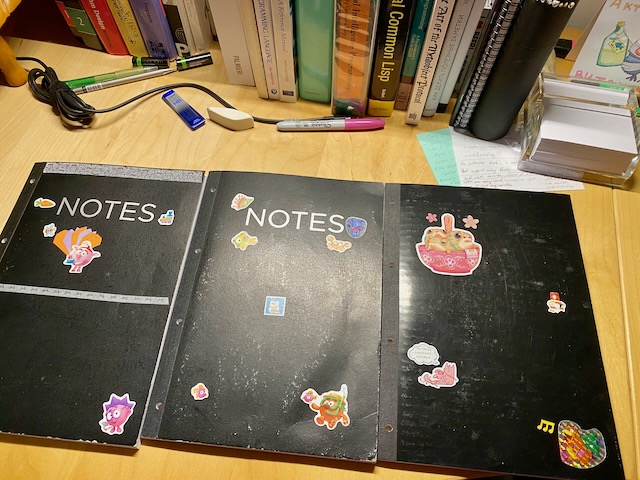In the past few months I made good progress on my side projects (DDPub, Typingvania) compared to the previous period of drought. What changed? I started writing about them by hand.
(Every journal is 140 A4 pages and I’m halfway through my third.)

I’ve been following a practice called “morning pages” created by Julia Cameron. I learned about it by reading her book “The Artist’s Way.” Previously I tried a similar practice called “freewriting” where you would ask a question and write for a predetermined short amount of time, but it didn’t stick. I’ve been doing the pages for about six months now.
It is as simple as is explained on the page above—you sit down, preferably every day, and write down a certain amount straight from your thoughts. For me the right amount is two pages of A4 which takes me about an hour to write. It’s quite a lot and I skip some days, but it works so I keep at it.
I use some space to write about my personal life, but over time I also started writing about the projects I’m working on. Usually it takes the form of a narrative around the next steps: Here I am in project right now: … The next two things I want to work on are this and this. How would I implement this approach? I would need to extend this object with such and such fields and add methods that would do this and this. When I transform this data, I’ll store it in this type of structure… I wonder if I could do this instead and rewrite that bit?
The same internal monologue would happen if I were sitting in front of the code editor, but it’s hard to fully follow the thread of thought when you’re there trying to write some code at the same time. Writing by hand forces you to complete the thought to the end.
There is some recent research showing higher brain activation when writing by hand. I don’t know if it’s that or not, but I often have really neat ideas when writing that I’m sure I would have missed otherwise—and I write them down immediately because I’m writing! Solutions to some architectural or UI problems simply presented themselves to me while I was writing. Clearly I thought about them previously, but I was also receptive during the writing sessions.
Another benefit of the morning pages (that I usually do during lunch or even in the evening) is that divorcing the planning from the execution really helps when you are mentally fatigued. I work full time and do my side projects in the evening, and after a full day of work there is sometimes nothing but static in my head. It’s hard to stop working only to sit down and start working again.
If I have written my pages, I already have a specific plan of the next steps, what exactly I want to do and how to implement it. It’s easier to sit down and start working on the side project when I’ve already done the hard part (came up with the implementation) and I only need to execute. The progress I make informs my next writing session, and the cycle repeats.
The pages may take quite a lot of time, but as I said, they work (for me). I started to work and make progress on ideas that were sitting in my notes for five years or more. If I don’t write the pages, I’m likely to spend the same amount of time just starting at the editor trying to collect my thoughts and understand what to do next, that is if I sit down to work on the project at all. The pages help with that too. I reacknowledge to myself why I’m doing what I’m doing and what result I’m expecting. I’m prone to be distracted and anxious, and the pages give me more focus than I feel otherwise.
The practice is simple so if you have similar problems as me, I encourage you to try it for a week and see if it makes any difference.